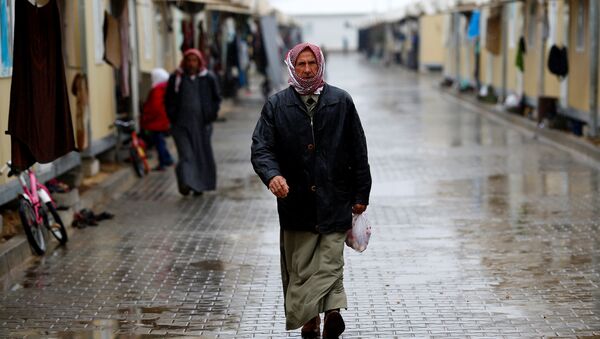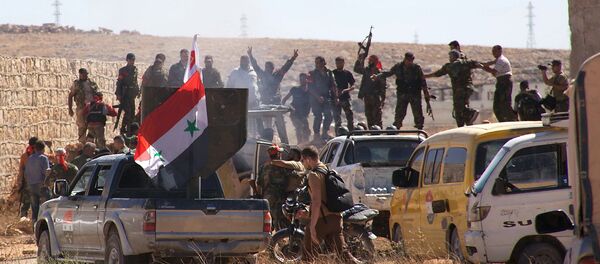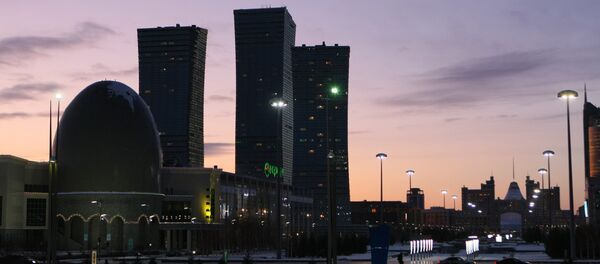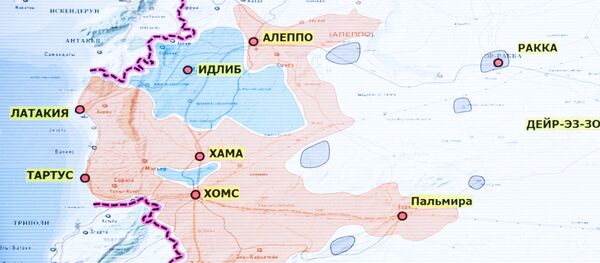“We’ll not forget what Erdogan has done for us”
Most of the Syrians living in the Kilis camp hail from Idlib and Aleppo, which is exactly where the Syrian ceasefire guarantor states — Russia, Iran and Turkey — have agreed to establish security zones to improve the humanitarian situation and help bring back the forced migrants, many of whom have found refuge in Turkey.
Just like the 15,411 Syrian refugees at the Kilis camp, Farid and his family live in one of the 3,184 containers made available to them by their Turkish hosts.
When asked whether he and his family planned to return to Syria, Farid said that they would wait until the war is finally over.
“We’ll never forget what Erdogan has done for us, and what Assad did,” Farid emphasized. "We are on the opposition’s side, that’s for sure.”
Sheik Ali’s family is comparatively well-off. He and his wife have a job and, together, they earn an equivalent of about $670 a month.
Not everyone at the camp is so lucky though. Vaddah Yaso, a 19-year-old young man from Idlib, said that his family applied for a residency in Canada five years ago and they were still waiting for an answer.
He added that it is up to the Turkish authorities to decide who deserves to get a new passport.
Vaddah also keeps a close eye on the news coming from the intra-Syrian talks in Geneva.
“The opposition delegates do not represent all Syrians,” he said.
A representative of the camp’s administration, Seifettm Cimen, said that 80 percent of those at the camp come from Idlib and Aleppo and as soon as the security zones have been established, many of them would return.
Looking for a job in Syria
The refugees are free to leave the camp to work outside. Some find a job across the border in Syria, including the husband of Hanan Saddadin, who teaches English at the camp.
He serves with the so-called Free Police (FP) in Syria’s al-Bab, which takes its name from the Turkish-backed Free Syrian Army (FSA).
According to Russian military sources, there are an estimated 42,000 militants active inside the four security zones to be established in the provinces of Idlib and Aleppo.
Painted on a concrete wall running across the Syrian border are the flags of Turkey and of the Free Syrian Army. FSA flags can also be seen on the doors of some of the containers the refugees live in at the camp.
When asked why they used the FSA flag instead of that of the Syrian Arab Republic, Seifettm Cimen chuckled and said that most of the refugees are from Idlib and Turkey supports the Syrian Free Army.
“White Helmets? Never heard about them”
There is a small hospital at the Kilis camp manned by four doctors and several paramedics.
Alptekin Caglak, a paramedic, said that the hospital also had a branch in Syria tending to anyone who needs help or, say, a prosthetic.
When asked if they had any patients suffering from chemical poisoning after the alleged attack in Idlib, Caglak said that they were taken to another hospital.
As for the independent medical organization called White Helmets, which was the first to tell the world about the alleged use of chemical weapons in Idlib, Alptekin Caglak said that during his three-year stint at the Kilis camp he had never heard about them.
The agreement provides for the demilitarization of the eastern countryside of Damascus, the northern suburb of Homs, the northwestern city of Idlib, and the southern one of Daraa.
Any clashes between the government forces and opposition armed groups must stop within the zones.
Never miss a story again — sign up to our Telegram channel and we'll keep you up to speed!





